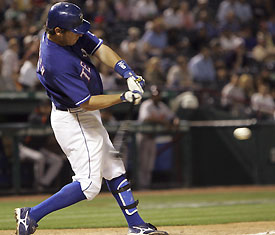Let’s say I have a crystal ball, and in early April I lay out to you what the Texas Rangers’ baseball season will look like by the end of July: They’ll have the lowest team batting average in the American League in June and July, I tell you. Their best hitter from last year will be out of the lineup half the time because of injuries and not hitting much when he does play.
The owner will default on a $525 million loan and need $30 million in loans from Major League Baseball to make payroll in June and July. Two young starting pitchers will be injured and lost for most of the season. Two other pitchers will be out of the lineup due to pneumonia and swine flu. A top hitting prospect will strike out in about half of his total at-bats and get sent to the minors. Only one Ranger will have a batting average above .300.
If you relied on those somewhat whacky predictions (swine flu? Tom Hicks defaulting on loans? C’m’on.) you’d have figured the Rangers would be more than 10 games under .500 and likely in last place in the American League West about now.
But as of this writing, despite all those things being true, the Rangers are 15 games over .500, just four games out of first place in the AL West, and a game and a half back in the wild card standings.
The fascinating aspect of this season, however, isn’t that the Rangers are winning, but how they’ve been winning: by pitching and defense, two traits this team has rarely been known for. True, the team leads the league in home runs, but most of them have been solo shots, and the team has a hard time scoring runs.
I don’t know how they’re doing it. Top starting pitcher Kevin Millwood has had an above-average season, but nothing stellar. Vicente Padilla, the guy with swine flu, has been his usual erratic self. The injuries to starters Brandon McCarthy and Matt Harrison have forced the team to bring pitchers without much major league experience up from the minors.
Those pitchers – guys like Scott Feldman, Dustin Nippert, and Tommy Hunter – weren’t even able to make the team at the end of spring training. But all have performed far beyond expectations after getting thrown into the fire in the past few months.
Some point to team president Nolan Ryan and new pitching coach Mike Maddox as the reasons for the turnaround on the pitching staff. Ryan suggested in the off season that the pitching staff might come to training camp in better shape and make more pitches per start, notions that didn’t seem that crazy to him, given the amount of money they are paid.
Ryan is old-school that way. Pitchers in his day regularly threw 150 pitches per start. He especially dislikes baseball’s definition of a quality start: six innings pitched and three runs given up.
“I’ll tell you, if I gave up three runs in six innings I was hacked off,” Ryan told a Boston reporter last month. “What’s the quality in that? You deserved to lose.”
Owner Tom Hicks’ financial woes are bound to have an effect on where this team goes from here this summer. Teams with playoff chances use trades to add players for the late season push, usually sacrificing “prospects” for expensive star players. The Rangers have lots of prospects but little financial flexibility, so they were neither buyers nor sellers before the trade deadline passed last week. Neither will they be signing up expensive free agents this off season.
But not trading away prospects might be good in the long term. General Manager Jon Daniels has asssembled loads of young talent in the minors, a system that the baseball statistic geeks rate as the top system among all major league teams. That talent will be on its way to Arlington in the next few years. And it will be cheap, something the new ownership (Hicks is trying to sell the team) should like.
So despite center fielder Josh Hamilton barely hitting his weight, leadoff man Ian Kinsler carrying an atrocious on-base percentage, and the team managing only about a .250 total batting average, the Rangers are still in contention. Maybe it’s the tough love of the hall-of-fame team president, maybe it’s manager Ron Washington’s emphasis on defense, or maybe it’s the youthful GM’s ability to asemble young talent. Probably all of the above.
It’s great that the Rangers are beating the expectations not only of the analysts but also the fans. But even better than current success is that the franchise, for once, seems to have a positive future with so many top propsects in the minors. And that is something Rangers fans have not had for a long time.











